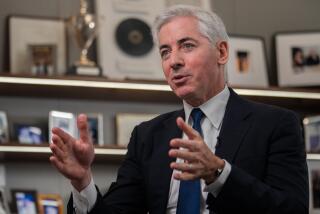CEO insists Herbalife is no pyramid scheme
- Share via
With investors punishing his company’s stock for a third consecutive day, the top executive of Herbalife Ltd. sought to reassure shareholders Friday that his company is not a pyramid scheme.
Working from the firm’s tony headquarters in downtown Los Angeles, Herbalife chief Michael Johnson telephoned institutional investors, including fund managers at Fidelity, disputing highly publicized criticism from prominent New York hedge fund manager Bill Ackman.
Johnson also assembled a team of about a dozen top company officials to prepare a point-by-point defense against Ackman’s assertions that Herbalife is a “sophisticated pyramid scheme” whose independent sales associates make more money recruiting new distributors than actually selling products.
“We’re looking at this and taking it apart, page by page,” Johnson said during a brief interview with The Times, the first public comment he’s made since Ackman’s presentation Thursday. “We’re going to disabuse the financial community of a presentation that was based on falsehoods and a misunderstanding about our business. It’s just so completely wrong.”
Pressure for Johnson to take action intensified Friday as Herbalife’s shares slid 19% to $27.27. The stock has dropped 36% since Ackman first said Wednesday that he was shorting the stock. It’s down more than 60% from its peak this year.
Founded in 1980, Herbalife is a so-called multi-level marketing firm that sells nutrition powders, bars, vitamins and grooming products through a network of individual distributors in more than 80 countries. The company reported $3.5 billion in sales last year.
Ackman, founder and chief of Pershing Square Capital Management, spent more than two hours Thursday dissecting Herbalife’s business model during a multimedia presentation in Manhattan attended by reporters and investors and streamed live on the Internet. The high-profile fund manager said only those at the top of Herbalife make any money, while more than 90% of distributors make nothing or even lose money.
“You can’t get to the upper levels unless you recruit,” Ackman said. “I don’t think very many retail sales are happening at all.”
Back in Los Angeles, Johnson denied those claims. He said millions of people around the world use the company’s products every day. Independent distributors are important because they can build relationships with consumers and counsel them about the products’ benefits, Johnson said.
Still, Herbalife has been damaged by the accusations, which Johnson said were “basically a call for the fall of the company.”
Refuting Ackman’s criticism will be difficult but not impossible, analysts said. Herbalife needs to address each of Ackman’s claims with data and sound evidence, they said.
“There are very few companies that have ever faced anything like this. It’s almost unprecedented in the history of investing,” said Tim Ramey, an analyst at D.A. Davidson & Co., who remains bullish on Herbalife. “They’ll have to very calmly go through and answer the charges that have been leveled at them.”
Things were not so calm at Herbalife headquarters Thursday. About 15 company officials, including Johnson, sat at a conference table in company headquarters and watched Ackman’s presentation, growing angrier as he made his case.
“There were a lot of cat-calls. He’s not up to speed on the Herbalife of today,” Johnson said. “It was so filled with inaccuracies I haven’t got the time. Our distributors get compensated for selling the product, not for recruiting.”
Ackman said he has shorted more than 20 million shares of Herbalife, a $1-billion bet that the company will fail. He said a team of researchers and lawyers spent one year building the case against Herbalife. They obtained every public document available to support his claim that Herbalife’s business model is an unsound and unfair system in which only top level managers make money.
He said he thinks his research will drive Herbalife out of business and vowed to hold his short position until the stock reaches zero.
Ackman has built a reputation as a savvy, highly educated and often contrarian investor. He has profited from another high-profile “short,” in which investors make money when a company’s stock price falls. Ackman previously bet against the Municipal Bond Insurance Assn., provoking a backlash until the financial crisis revealed MBIA’s inadequate capital levels.
His public accusations against MBIA prompted an investigation into Ackman by then-New York Atty. Gen. Eliot Spitzer.
“We put Bill through the wringer,” Spitzer said by phone Friday. But his office’s investigation turned up no wrongdoing. “As the record would prove in the long run, he was exactly right about MBIA’s lack of capital.”
Analyst Scott MacDonald, who covered MBIA’s bonds during its battle with Ackman, said the investor has earned credibility.
“He does his homework,” said MacDonald, now head of research at MC Asset Management Holdings in Connecticut. “He digs in deep, places his bets and tries to be very consistent with whatever he goes after, and that seems to have been a winning formula most times.”
Johnson, a fitness enthusiast who bikes from Malibu to his downtown offices most days, is a former Disney executive who has headed Herbalife since 2003.
“Like every challenge this company has had,” he said, “this is going to turn us into a better company.”
More to Read
Inside the business of entertainment
The Wide Shot brings you news, analysis and insights on everything from streaming wars to production — and what it all means for the future.
You may occasionally receive promotional content from the Los Angeles Times.










